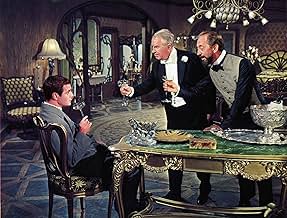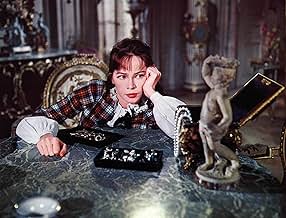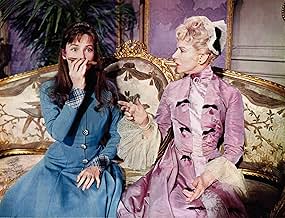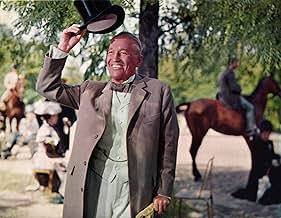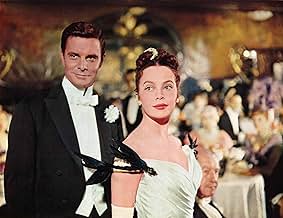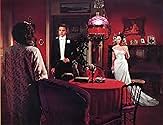Gigi
- 1958
- Tous publics
- 1h 55min
Lassés des conventions de la société parisienne, un riche playboy et une jeune courtisane en devenir jouissent d'une amitié platonique qui ne le restera peut-être pas longtemps.Lassés des conventions de la société parisienne, un riche playboy et une jeune courtisane en devenir jouissent d'une amitié platonique qui ne le restera peut-être pas longtemps.Lassés des conventions de la société parisienne, un riche playboy et une jeune courtisane en devenir jouissent d'une amitié platonique qui ne le restera peut-être pas longtemps.
- Réalisation
- Scénario
- Casting principal
- Récompensé par 9 Oscars
- 22 victoires et 9 nominations au total
- Girl at Maxim's
- (non crédité)
- Waiter at "Palais de Glace"
- (non crédité)
- A boy at Jardins des Tuileries
- (non crédité)
- Harlequin
- (non crédité)
- Gentleman in Park
- (non crédité)
- Maitre d'Hotel Maxim's
- (non crédité)
- Showgirl
- (non crédité)
- Restaurant Patron
- (non crédité)
- Gaston's Private Secretary
- (non crédité)
- Girl on Horseback at Pré Catelan
- (non crédité)
Avis à la une
Production-wise, it's almost too lavish for its own good. Vincente Minnelli wrings every bit of artistic decor in the trappings, giving the viewer an almost claustrophobic feeling for the interior scenes. The outdoor shots are just as lavish--Louis Jourdan singing the title song among the fountains and architecture of French landmarks.
The cast is perfect. Leslie Caron makes an enchanting Gigi, Louis Jourdan is impossibly handsome as Gaston, and all of the other players were cast with a discerning eye.
But there is no denying that no matter how distasteful some will find the story of training a girl to become a courtesan to be (or how politically incorrect by today's standards), the score is as sparkling as the champagne they sing about. While, in my opinion, the score does not surpass "My Fair Lady" in range and cleverness, it certainly did well enough in winning nine Oscars, including the one for Best Picture of 1958. By all means, it has to be considered one of the last great musicals from the MGM period.
Only drawback: it's a bit overlong and could have used some editing for the slow moments.
This is essentially a movie about a young girl pushed into sex work by her family of sex workers. She does not, at first, understand that's what's happening, but when she figures it out she's not happy about it. And I just don't see how that can be alright. It would be one thing if this were a commentary on a time when most women's only real path to power and fortune was through sex, but that's not what this is. This is a light frothy musical about something really bad.
And it's a shame, because it's full of great songs. Ignoring the sleaziness, Thank Heaven for Little Girls is charming. The Night they Invented Champaign is a fun, amusing number, as is I Remember it Well.
The performances are excellent, particularly Leslie Caron as Gigi. But I can't even watch this movie because I find it so creepy. Gigi's situation is heartbreaking, and while yes, it's a 50s musical that resolves everything pleasantly, Gigi is powerless in the equation.
As a youth I was horrified by a movie about someone my age who's agency had been taken away by "well meaning" relatives. As an adult I find it even more disturbing.
And yeah, a lot of people are just going to say I'm a buzzkill and it's just light froth. But I can't see it that way.
The three principals, Leslie Caron, Louis Jourdan, and Maurice Chevalier, along with the Paris locales helps maintain a distinctively French flavor, especially in the way the characters relate and interact.
For everyone who has commented on the political incorrectness of the story, a closer look will actually reveal the true feminist perspective of Colette's work which was groundbreaking for its time: 1) the story is a commentary and observation of the limited social and economic options for women outside of marriage during the turn of the century Paris, 2) Although Gigi (Caron) never fully masters her lessons and grooming, she is able to capture Gaston's (Jourdan) heart precisely because of her imperfections, and 3) most importantly, it is Gaston rather than Gigi who is forced to truly transform himself and defy the social conventions of the time to bring the story to its resolution.
Compare this to My Fair Lady, which offers similar social commentary but resolves itself in a more standard way: For example 1) Eliza Dolittle only becomes noticeable and lovable after transforming her outward appearance and speech patterns 2) Although Professor Higgins finally realizes his love for Eliza at the end, it is Eliza who is forced to submit her will by effecting a reconciliation that does nothing to resolve any of the issues raised in the scenes leading up to that point.
Definitely see Gigi and judge for yourself. (By the way, the widescreen version is sooooo much better. This is especially apparent in numbers such as "I Remember It Well" where entire characters are forced to be cut out of the screen.)
wonderful Maurice in the movie we have simply adored this film. There are so few treasures such as this one. Leslie Caron is nothing short of perfection in this role so young, and so beautiful. And too, I must mention the dashing young Louis Jordan as the much desired by all women, Gaston. I cannot tell you how many times I have heard that beautiful song in my head as he has discovered his Gigi is a "woman" now and not a child. My sister and I will forever keep this movie close to our hearts. I suggest anyone who is a romantic or loves musicals to go and rent this one right away!!
Oscars Best Picture Winners, Ranked
Oscars Best Picture Winners, Ranked
Le saviez-vous
- AnecdotesWhen Alan Jay Lerner met Leslie Caron in London to discuss the film with her, he was surprised to discover that Caron, who was of French birth, had become so immersed in the English culture that she had lost her French accent.
- GaffesDuring Gaston's song by the pond thinking of Gigi, there is a fence in the pond forcing the swans to stay in close background. The swans, obviously confused yet undeterred, keep swimming into the fence attempting to get to the swan in deep background on the other side of the pond.
- Citations
Aunt Alicia: Love, my dear Gigi, is a thing of beauty like a work of art, and like a work of art it is created by artists. The greater the artist the greater the art. And what makes an artist?
Gigi: Cigars and jewelry?
Aunt Alicia: Gigi, you're from another planet.
- Versions alternativesIn some prints shown on television, we see still photos of Leslie Caron part of the time during the song "Gigi", instead of seeing Louis Jourdan singing. (This occurs after the verse and first chorus, when the orchestra plays the song while Jourdan only exclaims "Gigi!") As shown currently, we see Jourdan singing throughout the whole song, as in the theatrical release.
- ConnexionsEdited into Histoire(s) du cinéma: Une histoire seule (1989)
- Bandes originalesThank Heaven for Little Girls
(uncredited)
Lyrics by Alan Jay Lerner
Music by Frederick Loewe
Performed by Maurice Chevalier
Meilleurs choix
Détails
- Date de sortie
- Pays d’origine
- Langues
- Aussi connu sous le nom de
- The Parisians
- Lieux de tournage
- Société de production
- Voir plus de crédits d'entreprise sur IMDbPro
Box-office
- Budget
- 3 319 355 $US (estimé)
- Montant brut mondial
- 789 $US
- Durée
- 1h 55min(115 min)
- Couleur
- Mixage
- Rapport de forme
- 2.35 : 1


